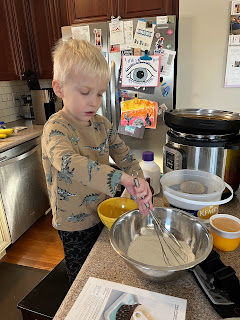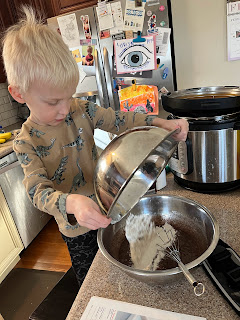For many of us, at least those of us in the US, we associate February 2nd with Groundhog's Day. For me, today is National Rheumatoid Awareness Day. I haven't posted on National Rheumatoid Awareness Day since back in 2016 when I wrote about the path to my diagnosis. Groundhog's Day does have a link to how this disease presents/gets treated. As I said back in 2016, "(You can) compare disease onset to the moment the groundhog comes out of his hole to look for his shadow. It's impossible to predict how aggressive the disease will be or whether treatments will be effective. The six weeks that the groundhog forecasts correspond to the short window of opportunity for people with rheumatoid disease to get early diagnosis and treatment, which has been shown to be a crucial component of positive outcome." (source: Rheumatoid Patient Foundation)
Sometimes I'm reticent to talk about RA because I don't want to come off as someone who is seeking pity or sympathy. But having a chronic autoimmune disease is part of who I am and it does impact my every day life. In my early years of having this disease, I kind of wanted to shove my diagnosis under the rug or ignore the fact that I have RA - I took all of my medications, saw my doctor regularly, etc, but I just wanted to be a "normal/typical" 30-something. But as I've gotten older - and wiser - I've recognized that I have to respect the fact that I'm not on an even playing field with my peers.
So what is RA, you may wonder? Rheumatoid Arthritis is an autoimmune condition that attacks the joints and causes inflammation along with other dangerous conditions. It is also one of the most common autoimmune conditions in the world. An estimated 1.5 million people/1% of the population in the US have it; 70% of those with the disease are women. There is no cure for the condition, but it can go into remission with proper and timely care.
I was diagnosed with RA in August of 2013 so I am coming up on 10 years of dealing with this disease. You'd think by now my doctor and I would have it all figured out, but like many health conditions, it's a wily disease that requires you to pivot often. I thought that now that we are done having children, my disease would be easier to manage (my RA was HORRIBLE during pregnancy), but my bloodwork in December was pretty crappy and showed the disease was not well-managed, necessitating a drug change. So I'm back on a more potent drug that I was on back when I was first diagnosed; hopefully, with time, I can drop some of my other drugs and reduce my pill burden. I'm on A LOT of drugs to manage it. I take about 5 pills/day morning and night, except for Mondays when I take 4 additional pills in the morning.
 |
| These are all my pill prescriptions which require an am/pm days-of-the-week pillbox. So sexy, right? |
Besides my oral meds, I also give myself an injection every other week. I've been on 3 different injections but am hoping to stay on this one (Humira) for quite awhile as I like that it's not weekly and it is the least painful injection of the 3. The consistency of one of the injections was so thick which made the injection uncomfortable. This one is nice and thin and the needle is so very tiny! Thank goodness I don't have any issues with needles! These drugs are insanely expensive - Humira costs about $6,600/month but luckily I only pay $10 out of pocket at most. Since the drug company makes so much money off this drug, they provide co-pay assistance and cover all but $10 of what the insurance company doesn't pay.

I'm lucky that I got diagnosed at a time when there were excellent drug options available. A former co-worker was diagnosed before the advent of these modern treatments and has permanent deformities in her hands since her disease wasn't well-managed. I'm also lucky that I have a wonderful physician who takes such good care of me. Before I found her, I had a pretty horrible (male) doctor who was never on time (I would wait for an hour plus for appointments) and at one point questioned whether I actually had RA... There is such a process to get approved for the above-mentioned expensive injections. An insurance company would NEVER approve them if it wasn't very clear that I had RA and needed an aggressive, expensive form of treatment. I did get a flare under his care so he eventually came to believe that I did have RA, but that experience pushed me to find a different doctor.
I don't want it to sound like having RA weighs on my mind all the time; it truly doesn't. Most of the time, I live a full, active, wonderful life. But I have to be more gentle with myself than pre-RA Lisa would have been. I have to prioritize sleep and when I get sick, I have to prioritize rest. I cannot "muscle" my way through a virus and expect my body to recover like a normal person. The drugs I am on suppress my immune system so that it doesn't attack my joints (that's the simplest explanation for what is happening when I have a flare - my immune system goes into overdrive and attacks my joints). Since I have a suppressed immune system, I catch nearly everything the boys bring home and it takes me longer to recover from viruses.
I also had to be extra extra careful during the pandemic, especially when vaccines were not available. That's why I did not eat in a restaurant until February 2022; it wasn't worth the risk of me getting sick. I had to say no to so many things which made me feel bad/guilty and resulted in some not-so-great comments/reactions from others. But I reminded myself I was following the medical advice of my doctors and making the right decision for myself/my family. I, of course, had the full and complete support of Phil through all of that!
All that is to say that managing this disease is tricky. On the surface, I appear to be this normal 40-something, but under the surface, that's far from true. I don't personally know anyone with RA - I'm obviously glad that no one I know has this disease but I sometimes wish I had someone to vent to who fully understands how I feel when I have a flare, for example. I am on the wait list for the book, The Invisible Kingdom, which is about managing an invisible chronic illnesses, based on the recommendation of Catherine of The Gilmore Guide to Books. I think that book will be helpful as I'll feel "seen/understood."
I'll close by saying that writing this post definitely moved me outside my comfort zone... So hopefully I struck the right balance between explaining the disease and acknowledging the challenges it presents without giving off a woe-is-me vibe!
Any questions? Do you know anyone with RA or another autoimmune disease?
















.jpg)






























